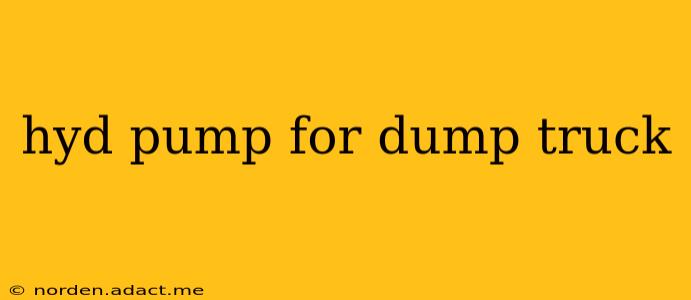Dump trucks rely heavily on their hydraulic systems for the crucial function of lifting and dumping their cargo. At the heart of this system lies the hydraulic pump, a critical component ensuring the smooth and efficient operation of the truck's dumping mechanism. Understanding the different types of hydraulic pumps used, their maintenance, and potential problems is essential for anyone operating or maintaining a dump truck. This comprehensive guide will delve into the intricacies of dump truck hydraulic pumps, addressing common questions and concerns.
What are the different types of hydraulic pumps used in dump trucks?
Dump trucks typically utilize several types of hydraulic pumps, each with its strengths and weaknesses. The most common are:
-
Gear Pumps: These are known for their simplicity, robustness, and relatively low cost. They're effective for lower-pressure applications and are often found in smaller dump trucks or those with less demanding lifting requirements. Their main drawback is a lower efficiency compared to other pump types, leading to higher energy consumption.
-
Vane Pumps: Offering a balance between cost and performance, vane pumps provide higher efficiency than gear pumps and are capable of handling moderate pressures. They are a popular choice for medium-duty dump trucks. Their relatively simple design also contributes to easier maintenance.
-
Piston Pumps: These are the workhorses for heavy-duty applications and high-pressure systems. Piston pumps boast high efficiency and the capability to handle substantial loads and pressures, making them ideal for large dump trucks and those operating in demanding environments. While more complex and expensive than gear or vane pumps, their superior performance often justifies the cost.
How do I choose the right hydraulic pump for my dump truck?
Selecting the appropriate hydraulic pump involves considering several factors:
-
Truck size and capacity: Larger dump trucks carrying heavier loads necessitate higher-capacity pumps capable of generating sufficient pressure and flow rate.
-
Operating conditions: Harsh environments or frequent heavy use might necessitate a more robust and durable pump, potentially a piston pump.
-
Budget: While piston pumps offer superior performance, gear or vane pumps represent more budget-friendly options.
-
Maintenance requirements: Consider the ease of maintenance and the availability of parts for the chosen pump type.
How much does a hydraulic pump for a dump truck cost?
The cost of a hydraulic pump for a dump truck varies considerably depending on several factors:
-
Pump type: Piston pumps are generally more expensive than gear or vane pumps.
-
Capacity and pressure rating: Higher-capacity pumps with higher pressure ratings typically command higher prices.
-
Brand and manufacturer: Reputable brands often come with a higher price tag but offer superior quality and reliability.
-
Replacement or repair: A complete pump replacement is naturally more expensive than repairing a faulty component.
How often should I replace the hydraulic pump in my dump truck?
There isn't a universally applicable timeframe for hydraulic pump replacement. Proper maintenance significantly extends a pump's lifespan. However, indicators of potential failure include:
-
Reduced lifting capacity: Noticeably slower lift times or an inability to lift the full load.
-
Unusual noises: Whining, groaning, or other abnormal sounds emanating from the hydraulic system.
-
Leaks: Hydraulic fluid leaks around the pump or elsewhere in the system.
-
Overheating: Excessive heat generation suggests potential internal problems.
Regular preventative maintenance, including fluid changes and inspections, is crucial to prolonging the life of your hydraulic pump.
What are the common problems with dump truck hydraulic pumps?
Several issues can affect dump truck hydraulic pumps:
-
Low fluid levels: Insufficient hydraulic fluid can lead to overheating and pump damage.
-
Contaminated fluid: Dirt, debris, or water contamination can severely damage internal components.
-
Worn seals: Worn seals lead to leaks and reduced hydraulic pressure.
-
Faulty bearings: Worn or damaged bearings can cause excessive noise and premature pump failure.
-
Improper installation: Incorrect installation can result in early pump failure.
Regular maintenance, using high-quality hydraulic fluid, and careful operation are essential to minimize these problems. Addressing any issues promptly will prevent significant damage and costly repairs. Consulting a qualified mechanic is recommended for any hydraulic system concerns.
